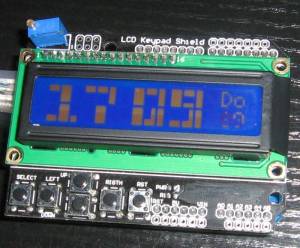DFRobot LCD keypad Shield
Und ein DFRobot LCD keypad Shield (Mai 2011, US $17,75 aus Hongkong)
Unterlagen, Schaltplan, Beispielcode:
http://www.dfrobot.com/wiki/index.php?title=Arduino_LCD_KeyPad_Shield_(SKU:_DFR0009)
etwas in Deutsch:
http://www.kriwanek.de/arduino/komponenten/156-lcd-shield.html
| Arduino Pin | LCD-Pin |
|---|---|
| Analog 0 | Taste (Up, Down, Left, Right, Select) |
| Digital 4 | DB 4 |
| Digital 5 | DB 5 |
| Digital 6 | DB 6 |
| Digital 7 | DB 7 |
| Digital 8 | RS (Command or Data) |
| Digital 9 | Enable |
| Digital 10 | Hintergrundbeleuchtung |
Neben einer normalen 2×16-LCD-Anzeige mit Hintergrundbeleuchtung gibt es 5 Tasten, die interessanterweise nicht einzeln auf Digitalports gehen, sondern nur über einen einzigen Analogport abgefragt werden: Die Tasten liefern über einen Widerstands-Spannungsteilerkette unterschiedliche Spannungswerte.
Die LCD-Anzeige kann über die Standard-Arduino-Bibliothek LiquidCrystal angesteuert werden. Initilaisierung
LiquidCrystal lcd(8,9,4,5,6,7);
Die Tasten werden so abgefragt:
//Sample using LiquidCrystal library
#include <LiquidCrystal.h>
/*******************************************************
This program will test the LCD panel and the buttons
Mark Bramwell, July 2010
********************************************************/
// select the pins used on the LCD panel
LiquidCrystal lcd(8, 9, 4, 5, 6, 7);
// define some values used by the panel and buttons
int lcd_key = 0;
int adc_key_in = 0;
#define btnRIGHT 0
#define btnUP 1
#define btnDOWN 2
#define btnLEFT 3
#define btnSELECT 4
#define btnNONE 5
// read the buttons
int read_LCD_buttons()
{
adc_key_in = analogRead(0); // read the value from the sensor
// my buttons when read are centered at these valies: 0, 144, 329, 504, 741
// we add approx 50 to those values and check to see if we are close
if (adc_key_in > 1000) return btnNONE; // We make this the 1st option for speed reasons since it will be the most likely result
if (adc_key_in < 50) return btnRIGHT;
if (adc_key_in < 195) return btnUP;
if (adc_key_in < 380) return btnDOWN;
if (adc_key_in < 555) return btnLEFT;
if (adc_key_in < 790) return btnSELECT;
return btnNONE; // when all others fail, return this...
}
void setup()
{
lcd.begin(16, 2); // start the library
lcd.setCursor(0,0);
lcd.print("Push the buttons"); // print a simple message
}
void loop()
{
lcd.setCursor(9,1); // move cursor to second line "1" and 9 spaces over
lcd.print(millis()/1000); // display seconds elapsed since power-up
lcd.setCursor(0,1); // move to the begining of the second line
lcd_key = read_LCD_buttons(); // read the buttons
switch (lcd_key) // depending on which button was pushed, we perform an action
{
case btnRIGHT:
{
lcd.print("RIGHT ");
break;
}
case btnLEFT:
{
lcd.print("LEFT ");
break;
}
case btnUP:
{
lcd.print("UP ");
break;
}
case btnDOWN:
{
lcd.print("DOWN ");
break;
}
case btnSELECT:
{
lcd.print("SELECT");
break;
}
case btnNONE:
{
lcd.print("NONE ");
break;
}
}
}
